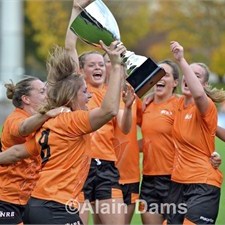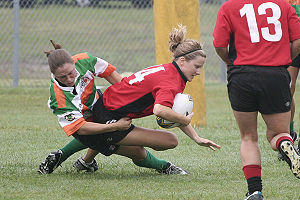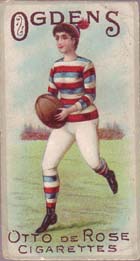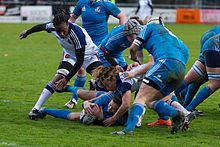

CASTRES, FRANCE – As my daughter has grown up and become more aware of the world around her, I’ve been forced to look harder at the place of women in society, from the image-obsessed west to the often troubling east.
The one place I ought to have found parity for women was in the sporting world, but it just isn’t so. Women’s sport in general lags way, way behind men’s in terms of advertising, uptake and coverage. That last one’s a failing on my part as much as it is anyone else’s – I was brought up on a diet of soccer, snooker, rugby, Formula 1… you name it, I was exposed to it. Making up the vast majority of this sporting menu were men.

At the time, I never questioned it: that was just how things were, and I never made the effort to look deeper. But now, as a parent, I’m disappointed at the vast chasm that exists between the sexes when it comes to something as supposedly universal as sport.
So, instead of ranting from an imaginary soapbox and getting nowhere, and while everyone else comes down from the amuh-azing high that was USA v the All Blacks, I’m going to educate myself – learn as much as I can about women’s rugby union – and the good folks at Rugby Wrap Up have opened the door as wide as it will go to accommodate me.
It begins, as these things inevitably do, with a search on the internet and that invaluable resource Wikipedia. I did visit the IRB site, which has an entire section (place the emphasis wherever you like, it still sucks) on women’s rugby that only appears IF you click on the news tab. Hmmm. So far, so totally underwhelmed.
Here’s my quickish guide then, to the story behind the women’s game.
Reading about the earliest days of women’s rugby was inevitably a depressing business. Instead of being hailed as pioneers, women who were keen to play the game in the late 19th century were met with at best disdain and at worst – in many cases – violence. As a result, matches were secretive affairs, so nobody really knows when the sport started. Instead of treasured, yellowed scraps of paper with faded handwriting, detailing the rules and regulations, there is an enormous, yawning silence…

It is known that rugby was played in some schools, but the first properly recorded incident of a woman taking to the pitch (and scoring a try – go girl!) was Emily Valentine, who around 1887, played for her school in Enniskillen, Ireland.
In 1917, a charity match was organised at Cardiff Arms Park and in the ensuing years, rugby union spread around the world, with teams being created as far afield as France and Australia. Down Under in 1921, a 30,000-strong crowd enjoyed a match between two ladies’ sides, but the prejudice against female players was so great, the unimpressed authorities put the kybosh on any further matches – for a decade.
Things finally started to improve around the 1960s, thanks to European universities forming teams, and it’s with no small hint of pride that I can reveal the first national association for women players was created in Toulouse, a stone’s throw from my home town of Castres.
Throughout the Seventies and Eighties, women’s rugby spread around the world, from Canada to Italy, Ireland to Japan, and by 1990, Rugbyfest, the first-ever international competition took place in New Zealand. Woohoo!
The Nineties should have been the golden decade for the game, a chance to really make strides as not one but two World Cup competitions were staged, with reasonable degrees of popularity. All that was needed for the women’s game to really take hold was support from the IRB.
It wasn’t forthcoming. Havering over granting the World Cups ‘official’ status meant the entire system was thrown into doubt, and it was only when the IRB set up the Women’s Advisory Committee, which in turn created a development plan for the game, that the recognition came.
The back end of the 1990s and the beginning of the 2000s saw an explosion both in terms of acceptance of the sport and audiences lapping it up. In Europe, the Women’s Six Nations was born, the RFWU set up their version of the Advanced Apprenticeship in Sporting Excellence at colleges in Gloucestershire and Northamptonshire, and the Women’s Sevens competition emerged, gaining IRB backing and near-parity with the men’s game. Finally, in 2016, the Olympic Games in Rio will see the men’s and women’s Sevens competitions held on a level playing field.

I’ve learned a lot, dipping my toe into this brave new sporting arena, but I’m not stopping here. I want to find out more: who are the stars of the women’s game – past and present – which are the top clubs – who are the likely contenders for the big trophies?
All these questions and more I aim to answer on my journey, documented for Rugby Wrap Up. I hope you’ll all enjoy the ride with me.
C’est moi. Feel free to add your thoughts below, look for and “Like” our Facebook Rugby Wrap Up Page and follow us on Twitter@: RugbyWrapUp,Junoir Blaber, DJ Eberle, Nick Hall, James Harrington, Cody Kuxmann, Jaime Loyd, Karen Ritter , Jamie Wall, Jake Frechette and Declan Yeats, respectively..

